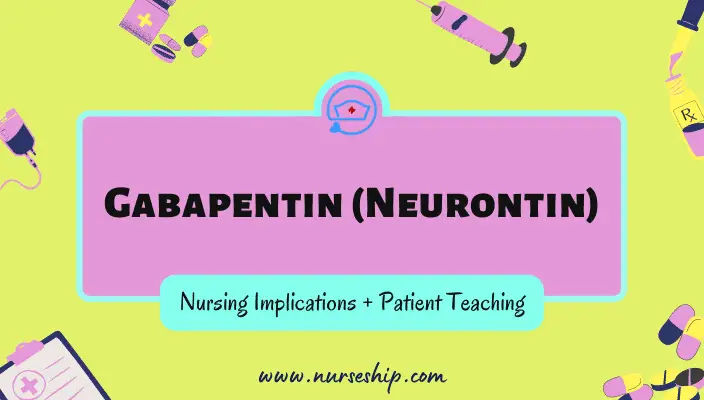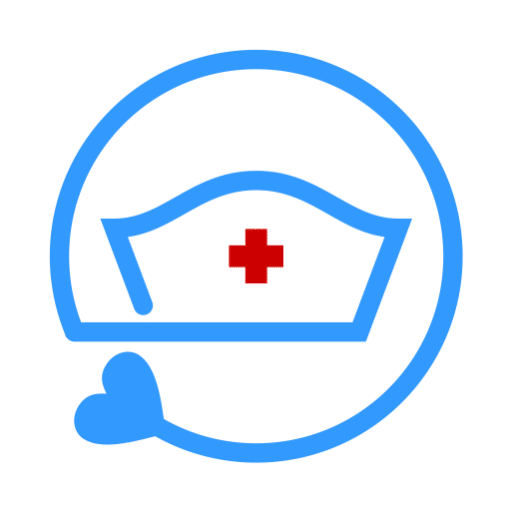Last updated on December 28th, 2023
Introduction
In this article, you’ll learn about Gabapentin (Neurontin) nursing implications and patient teachings. Also, its dosage, indication, contraindications, interactions, side effects, nursing assessment, and nursing interventions.
Generic Name: Gabapentin
Brand Names: Neurontin, Gralise, Horizant.
Gabapentin (Neurontin) Class and Category
Pharmacologic class: gamma-aminobutyric acid (GABA) analogue.
Therapeutic class: anticonvulsant, antineuralgic.
Pregnancy category: C
Gabapentin (Neurontin) Dosage
Epilepsy dosage
- Adults: PO: 300mg TDS. Maintenance dose: 900 – 1800mg/day in 2 to 3 divided doses.
- Children (3-12yrs): PO: 10 – 15mg/day in 3 divided doses. Maximum dose: 50mg/kg/day.
Postherpetic Neuralgia dosage
- Adults: PO: Day1 – 300mg od; Day2- 300mg bd; Day3 300mg tid.
Diabetic Neuropathy (off-label)
- Adult: PO: 900mg – 3.6g/day tid.
Gabapentin (Neurontin) Pharmacokinetics and Pharmacodynamics
| Route | Onset | Peak | Duration |
| PO (immediate-release) | rapid | 2 – 4 hr | 8 hr |
| PO (sustained-release) | unknown | 5 – 8 hr | 24 hr |
Absorption: Gabapentin (Neurontin) is effectively absorbed in the GI tract when taken orally.
Distribution: Protein binding is less than 3%.
Metabolism: Not metabolized.
Half-life: 5 – 7 hr.
Excretion: Through urine.
Gabapentin (Neurontin) Mechanism of Action
The exact anticonvulsant and analgesic action of gabapentin is unknown.
What are the indications of gabapentin (Neurontin)?
Gabapentin (Neurontin) indications include:
- to relieve neuropathic pain
- to treat epilepsy (seizures)
What are the contraindications of Gabapentin (Neurontin)?
The contraindications of gabapentin (Neurontin) are:
- Hypersensitivity to gabapentin
Caution: pregnancy, lactation, children <3yr, older patients, renal and hepatic impairment, hemodialysis, suicidal thoughts, depression.
Gabapentin (Neurontin) Interactions
Gabapentin (Neurontin) interactions include:
- Increased risk of CNS depression when taken with CNS depressants, antihistamines, and alcohol.
- Decrease effect of gabapentin when taken with antacids, sevelamer, and cimetidine; so, space medication time 2 hours apart.
- Increases hydrocodone’s therapeutic effectiveness, thus its dose may need to be reduced.
- When testing for urine protein with the Ames N-multistix SG dipstick test, false-positive readings may occur; utilize the sulfosalicylic acid precipitation process instead.
Herbal/food interactions
Following herbs/foods can increase CNS depression when taken with gabapentin.
- Kava
- Chamomile
- Valerian
What are the side-effects of gabapentin (Neurontin)?
Gabapentin (Neurontin) side effects / adverse reactions include:
- Fatigue
- Drowsiness
- Dizziness
- Ataxia
- Somnolence
- Weight gain
- Diarrhea
- Peripheral edema
- Dry mouth
- Blurred vision
- Nystagmus
- Life-threatening adverse effects: seizure (if abruptly discontinued the medicine), suicidal thoughts, eosinophilia, anaphylaxis, angioedema.
Gabapentin (Neurontin) Nursing Implications [Nursing Considerations]
Gabapentin (Neurontin) nursing implications are divided into nursing assessment, nursing interventions, and evaluation.
Gabapentin (Neurontin) nursing assessment
- Obtain detailed medical and drug related history including hypersensitivity, possible drug-drug and drug-food interactions.
- Assess the history of epilepsy; frequency, type, characteristics, onset, and duration of seizures.
- Assess the intensity, onset, duration, location, characteristics, aggravating and relieving factors of neuropathic pains.
Gabapentin (Neurontin) nursing diagnosis
- Risk for injury
- Chronic pain
- Ineffective coping
- Deficient knowledge related to drug’s adverse effects; disease process.
Gabapentin (Neurontin) nursing interventions/ actions
- Closely observe for any significant changes in behavior that could signal the onset or exacerbation of suicidal thoughts or behavior, or depression at the beginning of the therapy and after changing dosage.
- Administer the first dose of Neurontin before going to bed to lessen the chance of adverse reactions such as dizziness, ataxia. Gralise should be taken with the evening meal, whereas first dose of Horizant should be taken in the morning.
- Monitor patient’s weight and kidney function.
- To discontinue gabapentin therapy, the dose should be gradually tapered over a week.
- Remember that gabapentin brands are not interchangeable.
Evaluation
Evaluate the effectiveness of gabapentin: to decrease or stop seizures; to alleviate neuropathic pains; to improve mood stability.
Pregnancy/breastfeeding considerations for gabapentin (Neurontin)
- Gabapentin’s effect on fetus in unknown, so do not use it without physician’s direction.
- Gabapentin is excreted in breastmilk, so consult with physician before lactation.
Nursing patient teaching for gabapentin (Neurontin)
The nurse should discuss the following points during the Gabapentin (Neurontin) patient teaching.
- Teach the patient/family that extended-release tablet should not be cut, crushed, or chewed. If swallowing the gabapentin capsule is difficult, sprinkle its content over soft food or juice just before consumption.
- Teach the patient/family to take gabapentin at least 2 hours after taking an antacid.
- Advise the patient/family to take gabapentin exactly as prescribed and not to discontinue abruptly. Because frequency of epileptic episodes may increase.
- Instruct to the patient/family not to exceed 12 hours between t.i.d doses.
- Teach the patient CNS depressive such as ataxia, dizziness, drowsiness, and blurred vision effects of gabapentin and instruct the patient to refrain from engaging in high-risk activities until the drug’s CNS effects are known.
- Teach the patient/family about possible adverse reactions and hypersensitivity of gabapentin such as breathing difficulty, increase seizures, suicidal thoughts or attempts, depression and immediately seek medical treatment.
- Emphasis the importance of not missing any doses and to take missed dose as soon as he/she remembers. If his next dose is in less than 2 hours, tell him to go back to his/her regular schedule. Caution patient not to take double dose.
- Explain the importance of follow-up with physician to assess therapeutic effectiveness of the therapy (gabapentin serum level: therapeutic level 5.9-21 mcg/mL, toxic level more than 85 mcg/mL).
- Explain the patient that alcohol consumption may cause ataxia and impaired psychomotor function.
- Instruct the patient to carry identification card detailing the diagnosis and treatment.
Conclusion
You’ve learned about gabapentin (Neurontin) nursing implications (aka nursing considerations) and patient teachings in this article. In addition, you’ve learned about gabapentin’s mechanism of action, pharmacokinetics, dosage, indications, contraindications, side effects, nursing assessment, and nursing interventions.
Recommended Readings & Reference
FDA drug information
Frandsen, G., & Smith Pennington, S. (2020). ABRAMS’ CLINICAL DRUG THERAPY Rationales for Nursing Practice (12th ed.). Wolters Kluwer.
Kizior, R., & Hodgson, K. (2021). SAUNDERS NURSING DRUG HANDBOOK 2021. Elsevier Inc.
Jones & Bartlett Learning. (2021). Nurse’s Drug Handbook (20th ed.). Jones & Bartlett Learning, LLC.
Skidmore-Roth, L. (2021). MOSBY’S 2021 NURSING DRUG REFERENCE (34th ed.). Elsevier Inc.
Vallerand, A., Sanoski, C., & Quiring, C. (2019). Davis’s Drug Guide for Nurses (19th ed.). F.A. Davis Company.


